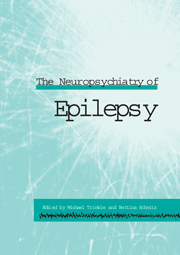Book contents
- Frontmatter
- Contents
- List of contributors
- Part I Background
- Part II Clinical aspects
- 4 The psychiatry of idiopathic generalized epilepsy
- 5 Epilepsy and learning disorders
- 6 Subtle cognitive and behavioural effects of epilepsy
- 7 Aggression and epilepsy
- 8 Epilepsy and suicide: a neuropsychiatric analysis
- 9 Postictal psychoses, revisited
- Part III Cognitive aspects
- Part IV Nonepileptic attacks
- Part V Treatment complications
- Part VI Treatment
- Index
5 - Epilepsy and learning disorders
Published online by Cambridge University Press: 05 October 2010
- Frontmatter
- Contents
- List of contributors
- Part I Background
- Part II Clinical aspects
- 4 The psychiatry of idiopathic generalized epilepsy
- 5 Epilepsy and learning disorders
- 6 Subtle cognitive and behavioural effects of epilepsy
- 7 Aggression and epilepsy
- 8 Epilepsy and suicide: a neuropsychiatric analysis
- 9 Postictal psychoses, revisited
- Part III Cognitive aspects
- Part IV Nonepileptic attacks
- Part V Treatment complications
- Part VI Treatment
- Index
Summary
Introduction
In the practice of epilepsy, the association between epilepsy and learning disorder is very important, even if sometimes underestimated. A correct and early diagnosis of a learning disorder in a person with epileptic seizures will often determine future development and prognosis.
Definitions
Cognitive function defines the capacity of the human brain to process all information coming from the outside and internal world of the individual, and program ongoing behaviour (Aldenkamp and Bronswijk, 1999). This capacity involves the ability to remain in contact with the outside world (through the function of vigilance), to select and focus information (through the function of attention), and to memorize data (through the function of memory). In this way, cognitive function gives humans the opportunity of becoming aware of themselves and to solve problems – something that we also call intelligence. The latter is the generic capacity of using all of the elements of thinking necessary to recognize, plan and solve new problems in a directed and correct manner.
More than one cortical area of the human brain is involved in cognitive function and related processes, and impaired cognitive function has been observed in the presence of a lesion or stable dysfunction in the temporal, frontal or parietal lobes of the dominant and nondominant hemispheres.
- Type
- Chapter
- Information
- The Neuropsychiatry of Epilepsy , pp. 62 - 69Publisher: Cambridge University PressPrint publication year: 2002
- 1
- Cited by



